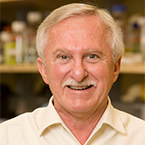
A renowned biochemist, Dr. Modrich is revered for his work in the area of mutation avoidance and for clarifying the mechanisms of DNA mismatch repair, which corrects copy errors during DNA replication. Dr. Modrich characterized the process of DNA mismatch repair in both humans and Escherichia coli and defined the molecular components responsible for the repair process. He was also among the first to determine that cytotoxic DNA lesions induced by chemotherapeutic agents can be recognized by the mismatch repair system, and that resistance to these agents can be attributed to genetic inactivation of components of the mismatch repair pathway.
Dr. Modrich’s research proved that defective DNA mismatch repair is capable of predisposing an individual to developing Lynch syndrome, also known as hereditary nonpolyposis colon cancer (HNPCC), as well as other cancers. He showed that Lynch syndrome and Lynch-like sporadic cancers could be attributed to deficiency of either MSH2:MSH6 or MLH1:PMS2, heterodimeric complexes required for DNA mismatch repair initiation.
These findings have since been expanded as it is now known that DNA mismatch repair function has also been linked to Huntington ‘s disease and other neurodegenerative disorders. Dr. Modrich’s ongoing research is focused on continuing to understand how mismatch repair impacts cancer therapeutic efficacy. He is also leading efforts to understand how this repair pathway influences the expansion of trinucleotide repeat sequences, which contribute to the development of Huntington’s disease and other neurodegenerative diseases.
Career Highlights
2016 North Carolina Award in Science
2016 Elected Fellow, National Academy of Inventors
2016 Honorary Fellow, Royal Society of Chemistry
2015 Nobel Prize in Chemistry
2005 Medal of Honor for Basic Research, American Cancer Society
2004 Elected Fellow, American Academy of Arts and Sciences
2003 Elected Member, Institute of Medicine
2003 Elected Fellow, American Academy of Microbiology
1999 Robert J. and Claire Pasarow Foundation Medical Research Award in Cancer Research
1998 Elected Fellow, American Association for the Advancement of Science
1996 Charles S. Mott Prize, General Motors Cancer Research Foundation
1993 Elected Member, National Academy of Sciences, Washington, D.C.
1986 MERIT Award, National Institutes of Health
1983 Pfizer Award in Enzyme Chemistry, American Chemical Society
1977 Henry and Camille Dreyfus Teacher Scholar Award